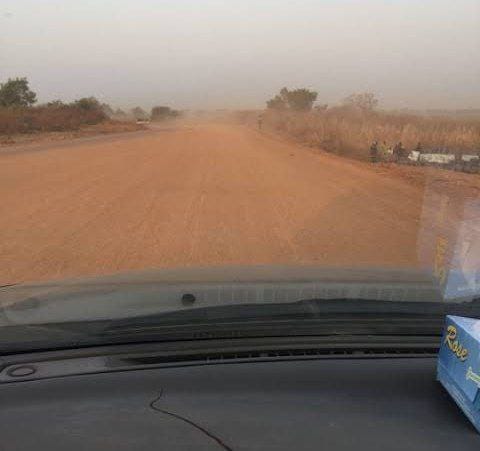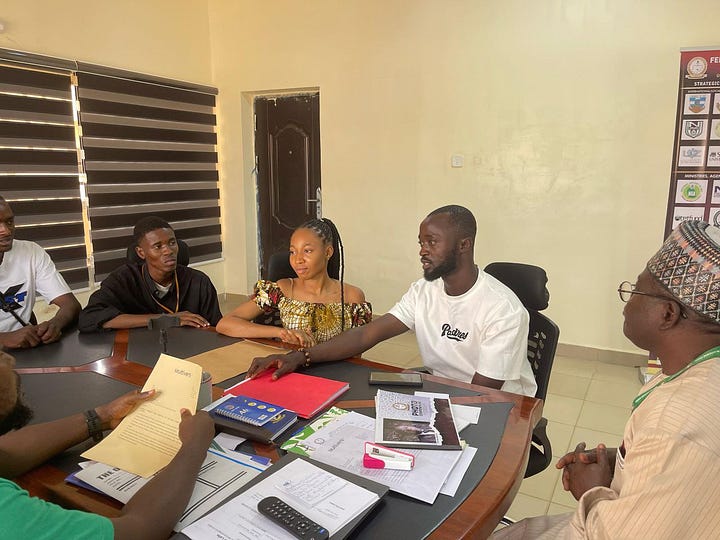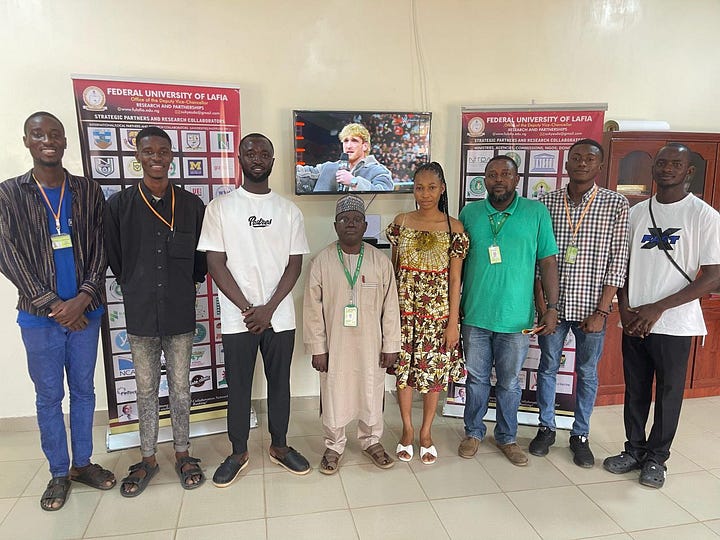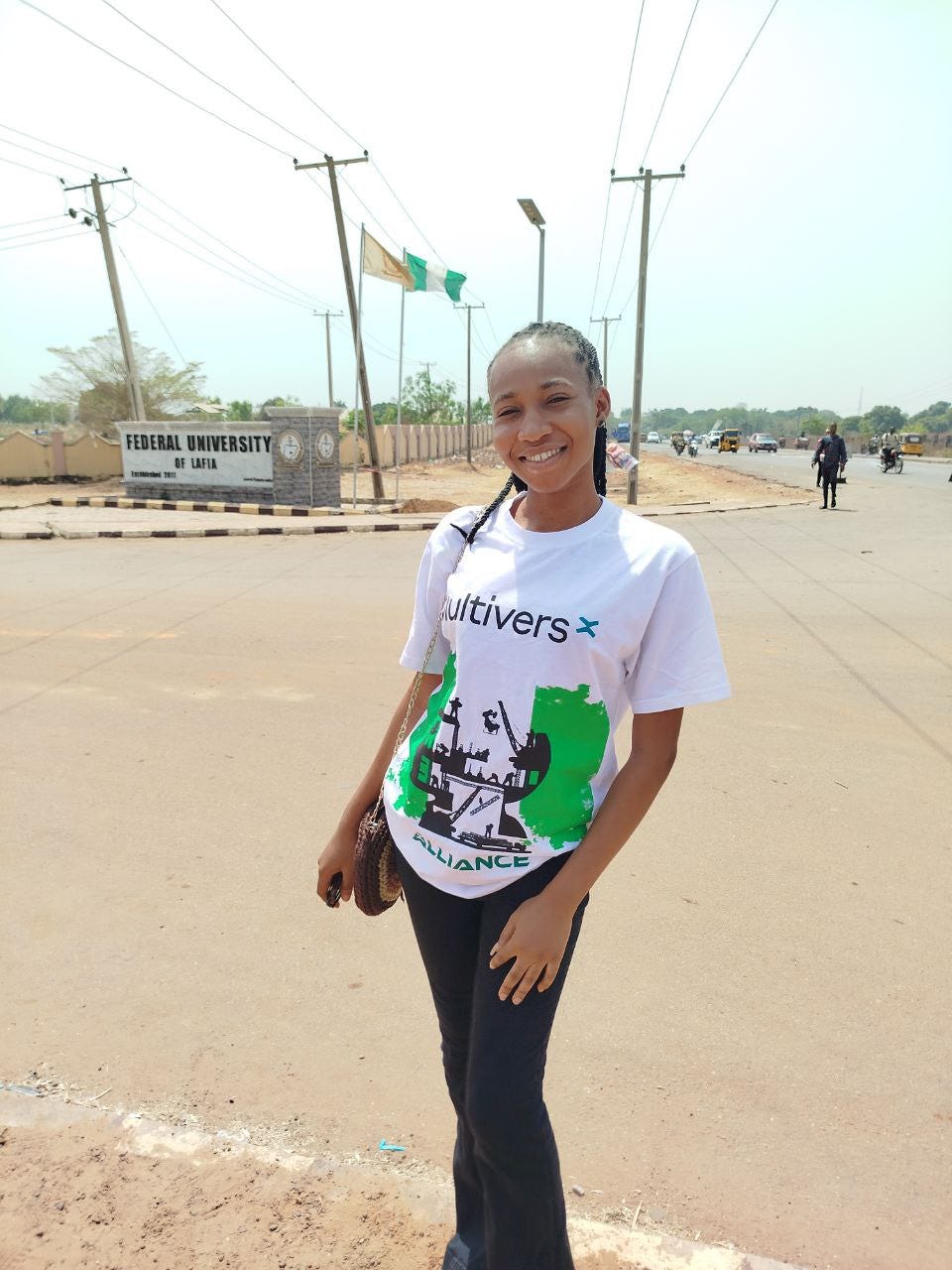Intern Intel: An xAlliance Journey (Part VIII)
Join our intern on her foray into MultiversX.
Buses, Bureaucracy & Blockchain:
My Fulafia Adventure
If there’s one thing you should know about Nigeria, it’s that everything—and I mean everything—requires patience, persuasion, and sometimes, pure luck.
You don’t just wake up one day and decide to organize a Web3 event in a Nigerian university without enduring a series of unfortunate events—long-winded bureaucracy, unexpected scheduling conflicts, and the soul-crushing realization that no one is in a hurry but you.
But I digress. Let’s start from the beginning.
The Plan
If anyone had told me months ago that I’d be sitting in a university office, explaining blockchain to a bunch of skeptical academics while sweating under Nigeria’s finest sun, I’d have laughed. But here we are.
This whole thing started with a simple goal—introducing students at Federal University Lafia (Fulafia) to the world of Web3 and MultiversX. The vision was to spark curiosity, provide access to networks and opportunities, and maybe, just maybe, leave them with a little more than just another academic sermon.
For weeks, I had been working behind the scenes with students from Fulafia. Multiple meetings were held. We drafted a formal letter and sent it to Lukas, who returned it on signed letterhead for approval.
The wait felt like eternity. But finally, we got a response: Approved.
With that green light, I packed my bags and prepared for what should have been a simple outreach trip. But nothing in Nigeria ever goes exactly as planned.
The Journey Begins
The road was long. Fifteen hours. Fifteen hours of shifting in my seat, inhaling enough dust to single-handedly build a house, and perfecting the art of nodding at fellow passengers who spoke only Hausa. Now, if you don’t know, Hausa is one of Nigeria’s major languages, spoken widely across the North, but unfortunately, it isn't part of my linguistic arsenal.


My brave attempts at small talk were met with amused chuckles and the occasional “Ba Hausa,” meaning, “No Hausa.” The message was clear. So, I surrendered to the true soundtrack of the journey—lively music blasting from the driver’s speakers, the steady growl of the engine, and the violent bam! of our bus hitting potholes deep enough to have their own postal codes.
And if you’ve ever taken these inter-state roads, you already know that seat belts are optional, snacks come pre-seasoned with sand, and by the time you arrive, you’ve either made peace with your life choices or started questioning them entirely.
Surviving The Road
Somewhere between the sixth hour and my third layer of dust seasoning, I accepted my fate. My water bottle had long given up on being useful. It was now a clear shade of brown and my legs had gone numb from the unforgiving seat.
Worst of it all, the hunger was real. Dust might build houses, but it doesn’t fill stomachs. I resorted to buying a stick of roasted corn, only to realize that my hands were too grimy to eat without accidentally consuming a piece of rural Nigeria. A dilemma. Eat and risk it? Or maintain my steez? I glanced around. No one cared. The driver was already halfway through his corn with the confidence of a man who had survived worse.
I took a bite. Survival first. Regrets later.
Suya: Street Meat Panacea
By the time I arrived, I was exhausted. My only consolation was suya.
Now for the uninitiated: suya is more than just grilled meat. It’s a cultural experience. Imagine skewered beef, seasoned with a mix of spicy, peanut-infused goodness, slow-roasted over an open flame. It’s smoky, spicy, and best enjoyed with raw onions and newspaper wrapping that leaves ink stains on your fingers.
If you haven’t eaten suya under a streetlight while trying to convince the vendor that the "free sample" he gave you should count as an extra piece, you might want to think again.
Anyway, after refueling on suya, I checked into my hotel and had a group call with Elijah (my friend in Lafia) and Sadan (the tech team lead). They handled the event setup with the university. Everything was set.
Or so we thought.
Bureaucratic Hurdles
If there’s one thing you need to know about Nigerian universities, it’s that lecturers never miss an opportunity to remind students who’s in charge.
We had planned everything down to the last detail—except for one tiny problem. The date.
Nobody told us our chosen date clashed with the sacred lecturers’ meeting day. Apparently, every last Thursday of the month, they all vanish into some mysterious academic gathering.
Still, we made our way to the Faculty of Science, hoping for final approval. The HOD barely glanced up as we entered, giving us the look lecturers give to unserious students begging for extra credit.
He skimmed through our letter like he was viewing it for the very first time, made a few corrections, and handed it back. “Print a new copy and correct the date.”
Just like that, we found ourselves back under the scorching Lafia sun, trekking to the printer’s shop like pilgrims on a mission. No complaints, no negotiations. Just a few determined souls, a crumpled letter, and the hope that this time, bureaucracy would show us mercy.
The Faculty Politics: Who You Know > What You Know
The HOD gave us a strict deadline—3 PM sharp.
At 3:05 PM, we sprinted in from the printer’s shop, papers in hand. But we were too late. He was gone. We called. No response. Tried again. Still nothing. At this point, even our phone screens were tired of showing "Calling...".
We paced the hallway like exam candidates waiting for results, hoping he’d magically reappear. He didn’t. We asked around—apparently, he had “stepped out.” Stepped out to where? The Bermuda Triangle?
Without the HOD’s effort to take it to the Vice Chancellor’s office, the event wouldn’t happen. And right now? The HOD wasn't picking his phone. Just as we were about to accept our fate, our friend Manasseh suddenly spoke up.
"My twin brother is in the Faculty of Computing."
We blinked. "And?"
"He might know someone who can help."
At that moment, we didn’t care if his twin had secret clearance to the Vice Chancellor’s office or just knew the janitor. When all else fails, find a relative and hope for the best.
Welcome To The Family
Manasseh’s twin finally came through, pulling some strings with the Faculty of Computing executives. Before we knew it, we were standing in front of the Faculty President and the Research & Partnerships President, pitching our case like contestants on a reality show.
They listened, nodded, and exchanged a look that made us hold our breath. Then one of them said, “Tomorrow, we'll see the Dean of our faculty.”
It felt like we had just unlocked the next level in a video game.
The next day, we went to his office. The office assistant told us he would let us in shortly. Great! He was in. At least no disappearing acts today.
He glanced up as we entered. We introduced ourselves, and unlike the HOD, this man was all smiles. He loved the initiative so much he called the Deputy Vice-Chancellor (DVC) on the spot. Just like that, we found ourselves in the DVC’s office.


At the DVC’s office, I gave yet another pitch (by this time, I could recite it in my sleep). He was intrigued, supportive, and even promised to attend the event. Finally, some good news.
D-Day: The T-Shirts, The Techies & The Unexpected Chaos
We had less than 60 hours to prepare for the event. I ran around handling logistics—printing banners, sorting refreshments, and confirming the T-shirts. Everything was set.
Then—T-shirt wahala.
Now, if you’re not familiar with wahala, let me explain. It’s a Nigerian word that means trouble, stress, or just pure headache. And at that moment, it was all three combined.
The printer hadn’t finished the shirts. Students were waiting. Time was slipping through my fingers. I was pacing, calling, and sending messages. The pressure was suffocating. Did we need them? What if they didn’t arrive at all? Would people take us seriously without them? My mind raced through every possible scenario while I stood there, helpless.
Minutes felt like hours. Then, at the last possible moment, the shirts arrived. No time to celebrate. I immediately changed into my mission attire and sprinted to the Software Engineering Lab with the rest.
Did I make it on time? Barely.
I burst through the door, out of breath, scanning the room. I immediately started apologizing.
“Sorry, sorry for the delay—technical issues—thank you for waiting…” I rattled off, trying to catch my breath.
But there was another problem: the school network.
Now, if you’ve ever tried to do anything remotely internet-dependent in certain parts of Nigeria, you’ll understand the frustration. We weren’t just dealing with slow Wi-Fi. We were fighting an invisible battle against an entire network provider’s mood swings.
And we needed that network.
A big part of our session involved getting the project director to welcome the students virtually and having the students download the xPortal wallet, which was literally the gateway to experiencing blockchain firsthand. We wanted to show, not just tell, how Web3 worked—how to create a wallet, receive tokens, and interact with the ecosystem.
How do you teach blockchain without the internet?
At this point, I could have panicked. Instead, I did what every seasoned event organizer does—I improvised.
I went full freestyle mode, breaking down MultiversX and xAlliance in the simplest, most engaging way possible. The Intern blog.chain style. No slides. Just storytelling. Making Web3 feel like an adventure rather than a tech lecture.
And the students? Sponges! Eyes locked in, nodding along—not the blank stares you get when people are lost. I got questions about the consensus mechanism of MultiversX and how it could carry out transactions in seconds. That's when I knew they were hooked.
The ultimate proof came when someone asked how to join xAlliance. At that moment, I knew—even without the internet, we had delivered.
Then, as if the universe was testing my patience, the projector and lights came on—just as I was almost rounding up.
Perfect timing
After some failed attempts of connecting with the students via livestream, xAlliance’s “original intern” Lukas had recorded a video with the most heartfelt message. It wasn’t just a congratulatory message; it was a wake-up call. He spoke about going beyond memecoins and temporary Web3 gains, emphasizing the need to build, learn, contribute, and create real impact in the space.
As we wrapped the event, we realized that some students couldn’t install their wallets due to poor network. So Elijah and I rescheduled a Google Meet session to complete the onboarding process. No one gets left behind in xAlliance.
Lessons from Lafia
University bureaucracy is a game of patience and persistence. If you think approvals are final, think again.
Nothing will ever go 100% as planned. Always have a backup (or two).
Knowledge multiplies when shared. Just a few months ago, I was walking Elijah through setting up his xPortal wallet so he could participate in the giveaway newsletter. Fast forward, and there he was—patiently guiding the university students through the same process.
The event was a success. The students were excited. They rushed to Twitter to share their experiences, tagging xAlliance and MultiversX in their posts. The engagement was wild. It felt surreal seeing them talk about staking and sharing how unique the xPortal wallet is.
Then came one last surprise.
Lukas dropped a link in my DMs. I clicked, scrolled, and nearly flung my phone. Beniamin Mincu—the founder of MultiversX—had reposted my tweet. Not just that, he gave a huge shoutout to xAlliance and Federal University of Lafia!
For a solid minute, I just stared. Was I dreaming? Was my phone hacked? Had I mistakenly entered an alternate reality where blockchain co-founders casually acknowledged young interns’ existence?
But no, it was real.
At that moment, all the dust, the hot scorching sun, and the bureaucratic battles—everything was totally worth it.
Honestly, I didn’t think much of the event at first. I just wanted to introduce a few students to MultiversX, get them to set up wallets, and maybe spark some curiosity. I wasn’t expecting it to turn into a thing. But students saw the potential of blockchain beyond the hype. Connections were made, and a new community was born.
This proves that Web3 isn't about tech, but about people. And sometimes, discovering the people requires you to take a long, dusty trip to Lafia.
Would I do it again? Absolutely. But next time, I’d be sure to triple-check the university calendar first.








Great one here. To a multiversx future ✊🇳🇬
This was an amazing read.
We’re gonna keep pushing MultiversX and xAlliance to the end of the world.